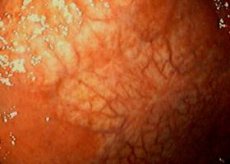Atrophic gastritis
Last reviewed: 23.04.2024

All iLive content is medically reviewed or fact checked to ensure as much factual accuracy as possible.
We have strict sourcing guidelines and only link to reputable media sites, academic research institutions and, whenever possible, medically peer reviewed studies. Note that the numbers in parentheses ([1], [2], etc.) are clickable links to these studies.
If you feel that any of our content is inaccurate, out-of-date, or otherwise questionable, please select it and press Ctrl + Enter.

Autoimmune metaplastic atrophic gastritis is a hereditary autoimmune disease, which is based on the defeat of parietal cells, leading to hypochlorhydria and a decrease in the production of the internal factor. The consequence of this process is the development of atrophic gastritis, malabsorption of vitamin B 12 and often pernicious anemia. The risk of developing carcinoma of the stomach increases threefold. Diagnosis is established with endoscopy with biopsy. Treatment of atrophic gastritis consists in parenteral administration of vitamin B 12.
Read also:
Causes of atrophic gastritis
Patients with autoimmune metaplastic atrophic gastritis develop antibodies to parietal cells and their components (which include internal factor and proton pump H, K ATPase). Atrophic gastritis is transmitted as an autosomal dominant trait. Some patients also develop Hashimoto's thyroiditis and in 50% determine thyroid antibodies; on the contrary, antibodies to parietal cells are found in 30% of patients with thyroiditis.
The lack of an internal factor leads to a deficiency of vitamin B 12, which can lead to megaloblastic anemia (pernicious anemia) or neurologic symptoms (subacute combined degeneration of the spinal cord).
Hypochlorhydria leads to G-cell hyperplasia and increased serum gastrin levels (often> 1000 pg / ml). An increase in the level of gastrin in turn leads to hyperplasia of enterochromaffin-like cells, which are sometimes transformed into a carcinoid tumor.
In some patients, atrophic gastritis can be associated with a chronic infection of Helicobacter pylori, although this connection is not fully understood. Gastrectomy and prolonged suppression of acidity by proton pump inhibitors cause a similar deficiency in the secretion of the internal factor.
Areas of atrophic gastritis of the body and the bottom of the stomach may manifest as metaplasia. Patients with atrophic gastritis have a 3-fold higher relative risk of developing adenocarcinoma of the stomach.
Symptoms of atrophic gastritis
Typical complaints for chronic atrophic gastritis are:
- feeling of heaviness, fullness in the epigastrium after eating, less often - dull pain in the stomach after eating;
- belching with air, and with severe secretion deficiency - rotten, eaten food, bitter;
- heartburn, a sense of metallic taste in the mouth;
- poor appetite;
- with severe secretory deficiency, there are symptoms of atrophic gastritis due to impaired bowel function (rumbling, transfusion in the abdomen, unstable stools);
- complaints caused by functional dumping syndrome: after eating a meal rich in carbohydrates, there are sharp weakness, dizziness, sweating.
These symptoms of atrophic gastritis are due to the fact that in connection with the low content of hydrochloric acid in the stomach, carbohydrates of food quickly enter the small intestine, are absorbed into the blood and cause a large release of insulin.
Diagnosis of atrophic gastritis
The diagnosis of "atrophic gastritis" is established with endoscopy with biopsy. B 12 serum levels should be determined . In the blood, antibodies to parietal cells can be detected, but their level can not be determined by routine methods. The problem of endoscopic screening for the detection of cancer is ambiguous; follow-up studies are not required if there are no histological changes (eg, dysplasia) or symptoms of atrophic gastritis during the initial biopsy.
What do need to examine?
Who to contact?
Treatment of atrophic gastritis
In addition to parenteral replacement of vitamin B 12 deficiency , no treatment of atrophic gastritis is required.
More information of the treatment


 [
[